We know it's not always possible to have time to go to your favorite store to play Magic. In fact, there isn't always a store close by.
Also, when you're just getting to know the game, it's good to have different ways to play it and learn more and more about it.
With Magic Arena, access to our beloved card game has been made easier as it is free and beautiful. Many players, new or veteran, have had more opportunities to play it. Magic: the Gathering Online (MTGO) has been around since 2002 and is less pretty, with an “almost real” monetary system, plus a different way to access tournaments.
Ad
But what if you want to migrate from one platform to another, to have new experiences? We have prepared this guide to help you.
What is the difference between Magic Arena and MTGO?
The main difference between the two is the economy and the ways to acquire new cards. In addition, there is also a difference between the available formats.

Magic: the Gathering Online (MTGO) was the first virtual platform created to play Magic, with its own currency system and in-game commerce and buy cards as if they were real. It is only available for PC and to purchase an “official account”, there is a fee of 5 dollars.
There's a tournament system divided by format, and there's all the eternal formats there, Draft and Sealed events, plus a casual area. The game isn't so “pretty”, but it is very useful to understand some concepts like the stack and trigger resolution.

Magic Arena is a free to play platform, with a card acquisition system similar to other online games, through Boosters that can be purchased with in-game currencies, achieved through daily missions, tournament prizes and the like. . It is also possible to buy “gems”, another type of currency, with your credit card.
The good thing is that it is available for both PCs and Mobile, both being integrated.
The formats in Magic Arena are more limited than in MTGO, which has eternal formats, but it is free and gorgeous. Many people play Magic Arena, and it is also possible to use it as a gateway to the game.
Game economy and card acquisition
Acquiring cards in MTGO
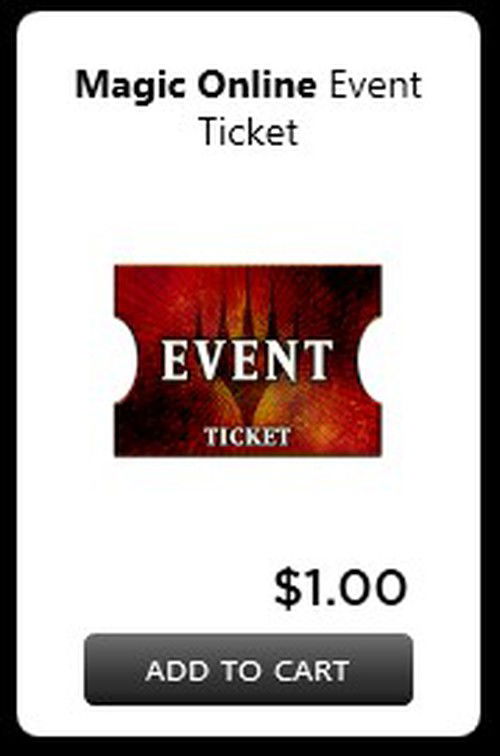
In MTGO, the economy revolves around “Tickets” (TIX), which are nothing more than a representation of real money within the game. You can buy them with a credit card, or even from other players.
So, to buy cards, there are online stores that sell virtual MTGO cards in exchange for TIX. Having the TIX in "hands", it is possible to access the stores both within the game and on the store's websites, by registering. It is possible to acquire an entire list at once if you have its file, searching all the cards simultaneously.
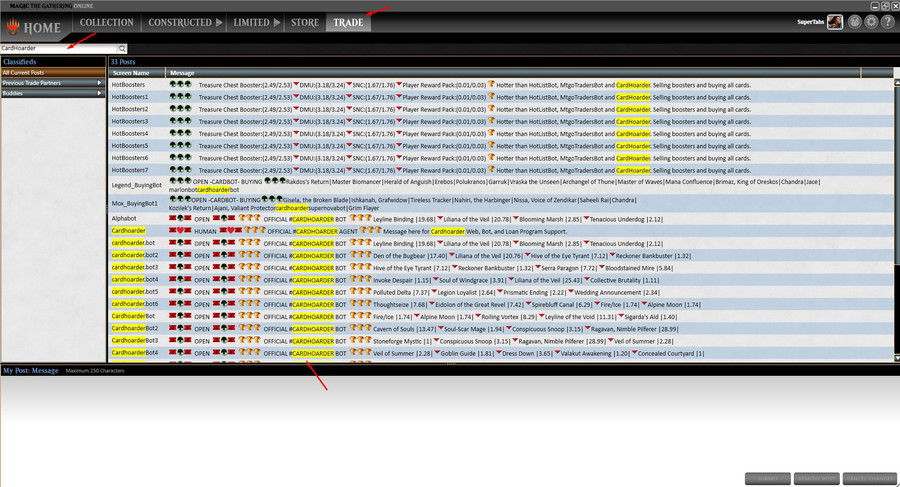
Opening the “Trade” tab, it is possible to locate your favorite store and propose an exchange (sale or purchase) with it.
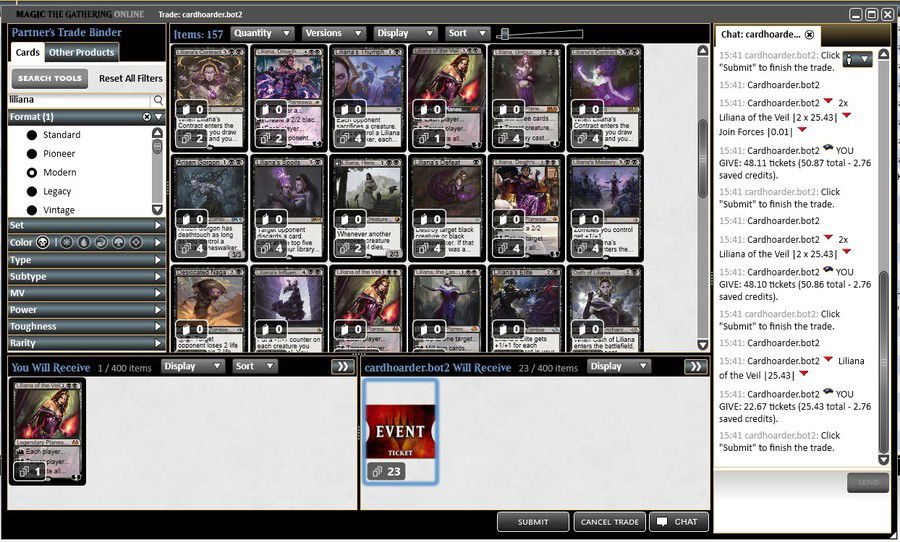
The Bot will deduct the tix according to the card's value. If you don't have them, you won't be able to make the purchase. After this screen, the bot will confirm that this is what you want in your order, and if you confirm, then the transaction is complete.
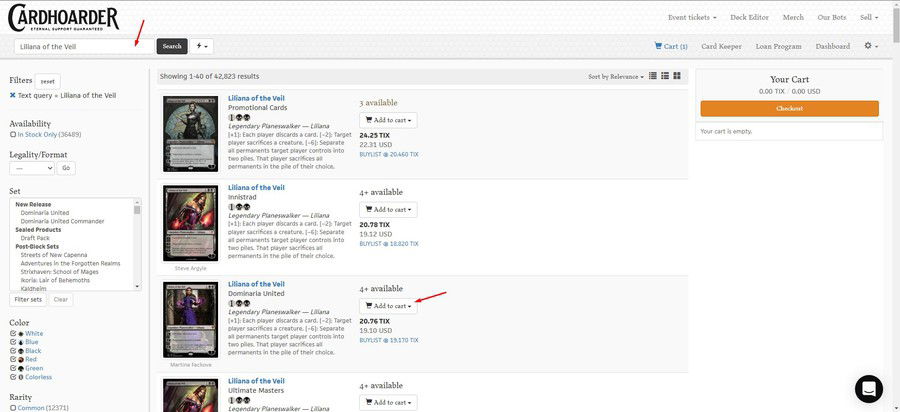
On the website of a store (in this example, we use CardHoarder), just register and look for the card on the website. If you find it, you can add it to your cart.
Ad

When you've included all the cards you want to purchase, and you've acquired the necessary tix (buying on Magic Online or even from trusted players), just confirm the purchase.
The store will send you an exchange request in Magic Online itself, just carry out the same process as above, selecting the cards, and the bot will request the necessary TIX.
It is also possible to purchase booster packs (both in the game's official store and online) and open them to acquire new random cards. There is also the possibility to buy Treasure Chest Boosters winning events with paid entry or buying directly. I'll talk about that later.
But I mentioned here the way to acquire a complete deck with cards, just like in real life we often choose to buy precons or specific cards, since opening booster packs can be much more expensive, and we won't always find exactly what we're looking for.
Acquiring cards in Magic Arena
At Magic Arena (MTGA), there is gold, which is the game's free play money, and gems, which are purchased with real money. You can usually buy boosters and other items in the in-game store with both currencies.
To get gold, you can do daily quests, rank up and earn rewards at the end of the season, or even participate in paid-entry events and do well in them.
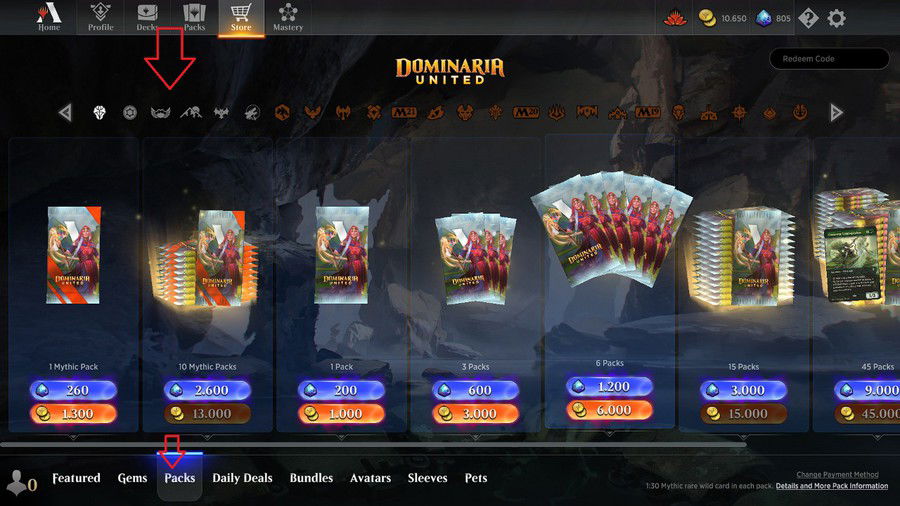
To purchase boosters, just enter the store and go to the packs tab inside the store. At the top, you can select which set you want to purchase boosters from.
After purchasing them, simply open them in the “packs” section above.
When you open Packs, you also end up acquiring Wildcards of various rarities. These are used to craft a card chosen by you, of the same rarity as the wild. But be careful when using them, as it's hard to acquire them in large quantities, and in the future they may be needed!
Draft and Sealed in MTGA
In the MTGA, one thing that players do and highly recommend is playing the draft and sealed format events that you can keep the cards, since when you open the event booster packs, you can keep them — and you get to choose them in the process. . What's more, if you secure the necessary wins, you still earn gems in the process (or at least get your entry back).
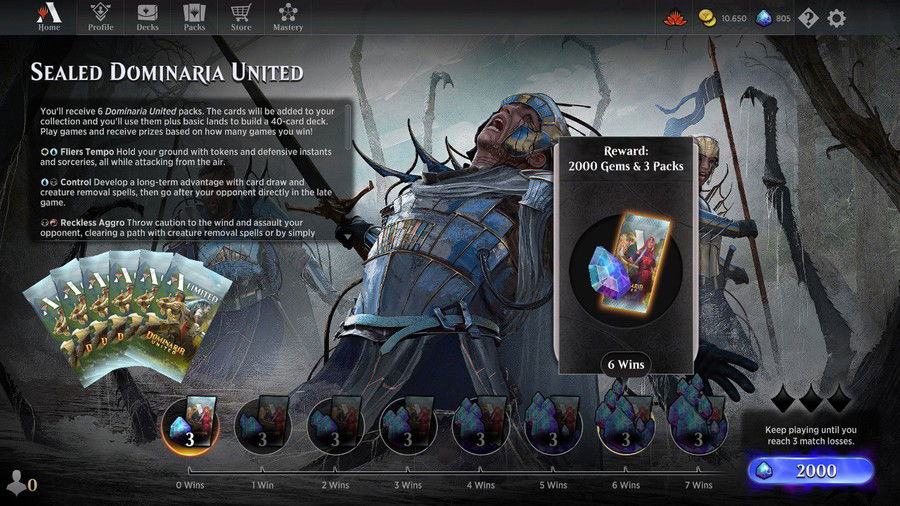
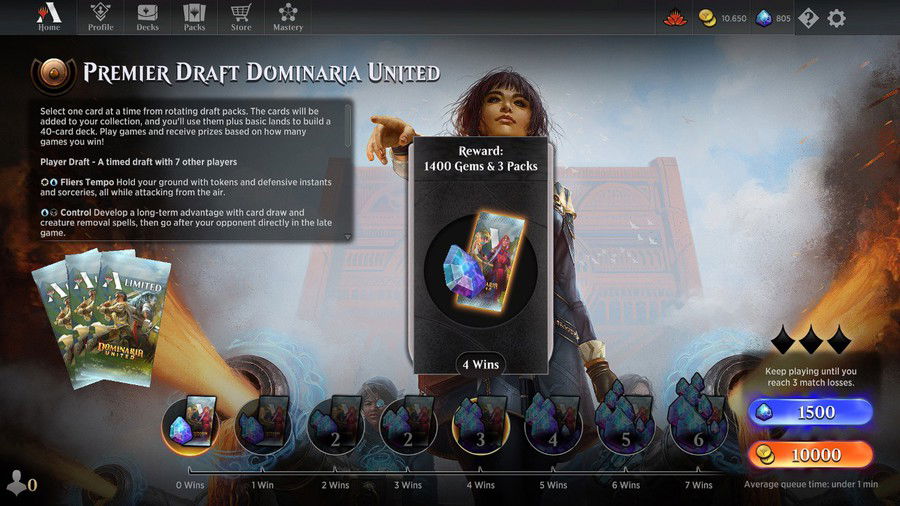
As these events have paid entry, it is good to study and evaluate your options and choices before entering, as it ends up being an investment.
Building decks
In MTGO
To build a playable deck in MTGO, simply buy the cards as explained above, in the “acquiring cards” section. Once they are in your account, in the Collection tab you can either export a list from somewhere else, in .dek , .txt or .csv formats, or go researching the cards you have and including them in your list.
Ad
In the search box, you can filter your search using several parameters, such as Format, Color Identity, Cost and Type, in addition to words.
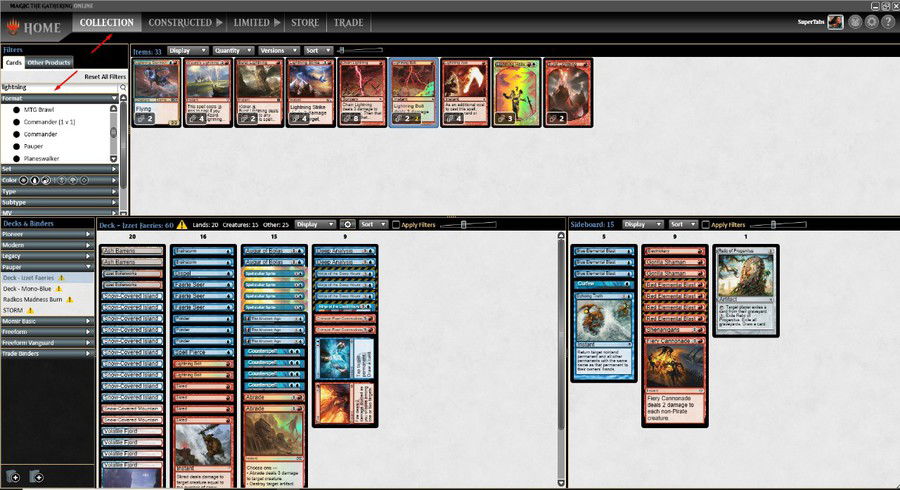
It is also possible to “create a list”, but without having all the cards. It won't be playable, and cards you don't have will be highlighted — but it's a useful feature for viewing and organizing your list before acquiring the missing cards, for example.
You can Import and Export your decks whenever you want — it's just not possible to trade or sell cards that are on a registered list in a paid event. Once the event is over, they are released again.
In MTGArena
In Arena, the process is relatively similar — both when creating a deck with cards you don't have, and when searching for cards within the deck. It is also possible to import and export lists.
To create a deck “from scratch”, just click on the + sign in the “My Decks” section and have fun. Don't forget to save when finished.
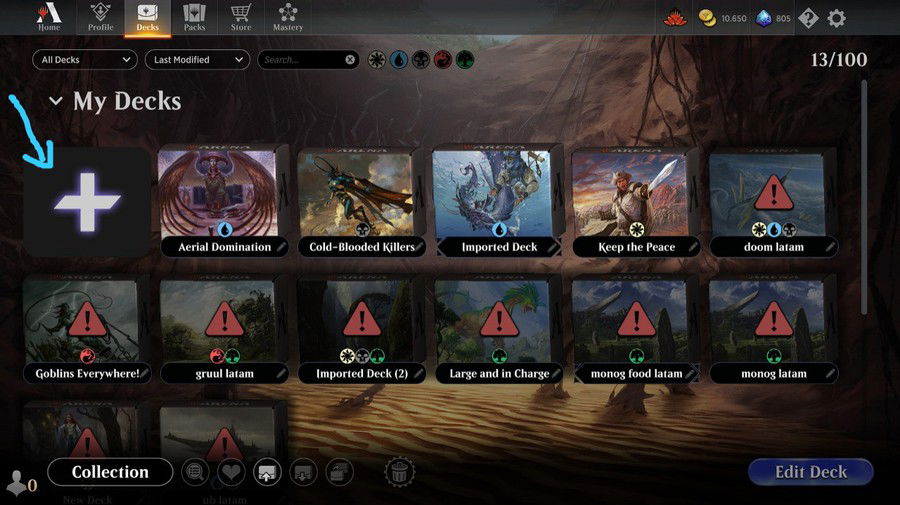
To build your deck, just search or search for your cards and, by clicking on them, they will be added to the list. Remember to choose the format.
If you want to remove a card, just click on it in the list menu on the right. To add more copies, just click on the quantity within the list.
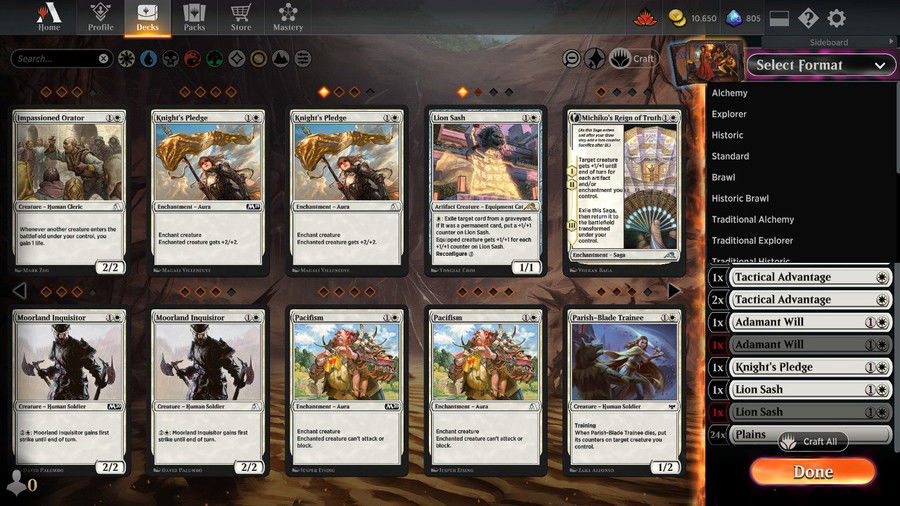
If any card in the list is marked in red, it's because you either don't have it yet, or you don't have enough copies.
If you want to acquire more copies of a particular card, you can “craft” it with wildcards or try to open booster packs from the same set to find it.
Participating in Tournaments
Tournaments in MTGO
At Magic Online, there are several types of casual or paid-entry tournaments.
When you win or lose certain tournaments, you earn a virtual currency called “Player Point” (also known as “PP”), which cannot be traded and serves as entry into other tournaments.
It is also possible to open “Treasure Chest Boosters” as a reward. A chest can contain Magic cards, PP's and/or avatars that will stay in your collection. See more information here.
As a prize, there are also Qualifier Points (QP's), which with a large amount can be used to enter large and competitive tournaments, such as Qualifiers or PTQs.
Gauntlet
There is a “phantom” tournament, accessible with a currency that every beginner wins and cannot be traded, called “new player points”; in this tournament, you pay 3 of these points and receive a random Modern deck that will disappear after the tournament. Your opponents also get a random deck.
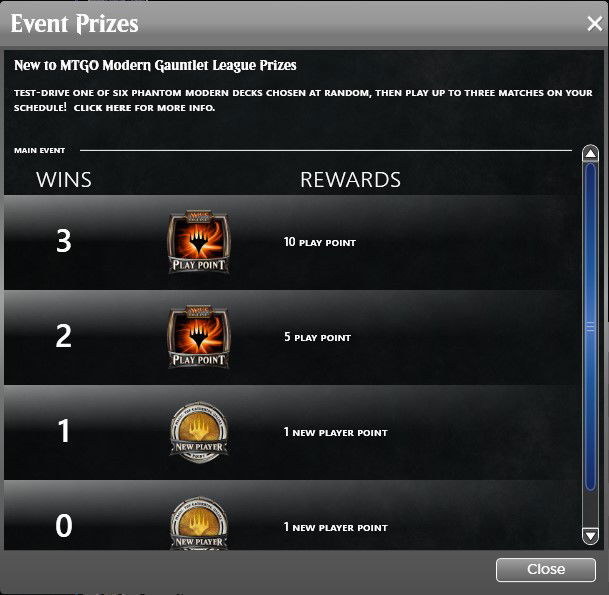
Limited and Constructed
On the Limited and Constructed tabs, there are tournaments of every imaginable format:
Draft, Sealed, Standard, Pioneer, Modern, Legacy, Vintage, Pauper, Commander and some special formats in the “Specialty” sub-tab, with Momir Basic, Planechase and Freeform.
Ad
Within these formats, the main tournament types are:
Leagues
In a League, you enter with a deck built by yourself and of the proper format, to play 5 games against other opponents.
Entry is 10 TIX or 100 Play Points (PP's).
You can open a League and play a match, and after finishing it, play the other matches on another day. Just be careful not to forget to play, as the season can end and another one begins. If you enter with the wrong deck, before starting the first game, you can "quit" from League and you will win the entry back.
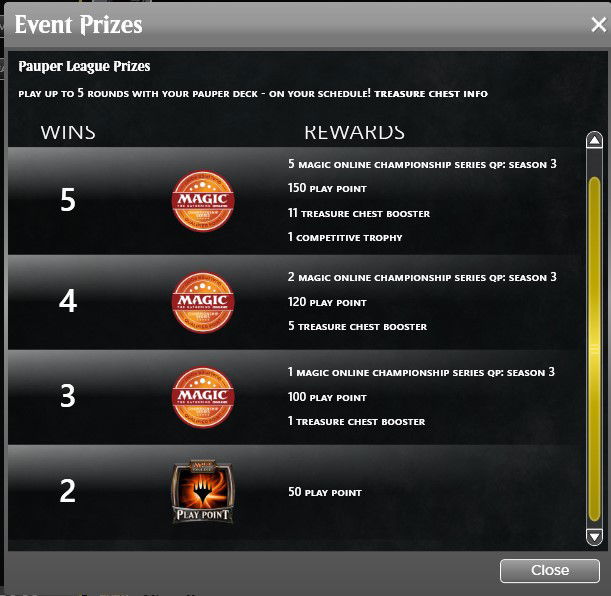
Challenge
Challenges are highly competitive tournaments that take place according to the schedule, usually on weekends, at specific times. It's like a big store tournament.
The number of matches usually varies according to the number of players, but there is always a cut to Top 8. It's usually around 7-9 matches in total if you make it to the Top.
Entry is 30 TIX or 300 PP's.
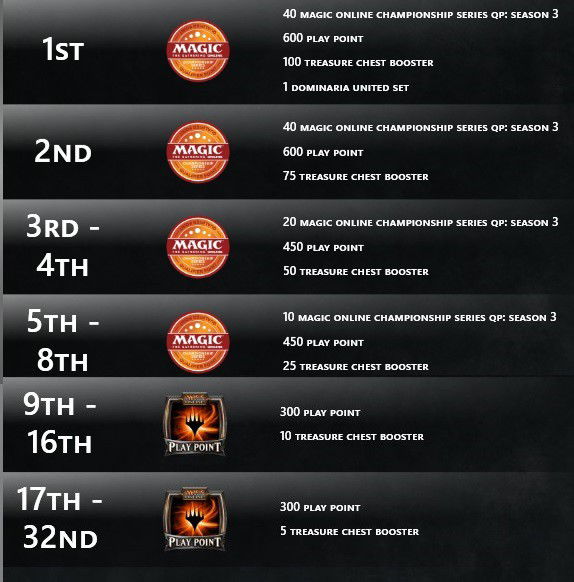
2-player Queue
Here, you and another player play a single best-of-three game, vying for PP's for the winner.
Entry is 20 PP's or 2 TIX.
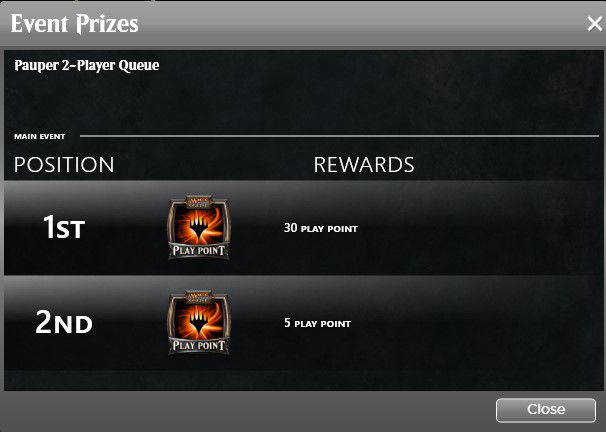
Casual Matches
Almost all formats have, in addition to the paid tournaments I mentioned above, the possibility of casual matches against other players — just for the pleasure of playing and testing decks, without necessarily getting anything in return.
They are called “(Format) Tournament Practice”, with best-of-three matches, or “(Format) Open Play”, with best-of-one matches.
Tournaments at MTG Arena
At Magic Arena, there are promotional tournaments, such as “FNM”, where you don't pay entry and earn some bonus just for participating, such as promo cards, sleeves or some coins.
To participate in any tournament, just go to the homepage and click on the “Play” button. A new tab will open, and you will be able to choose the Event type (Limited or Constructed), or the normal game – which can be a Ranked or Casual game – and whether it will be best of 1 or best of 3 (with sideboard). In this option, there are Standard, Alchemy, Historic, Explorer or against Bot formats. You can see about the formats in more detail in this article.
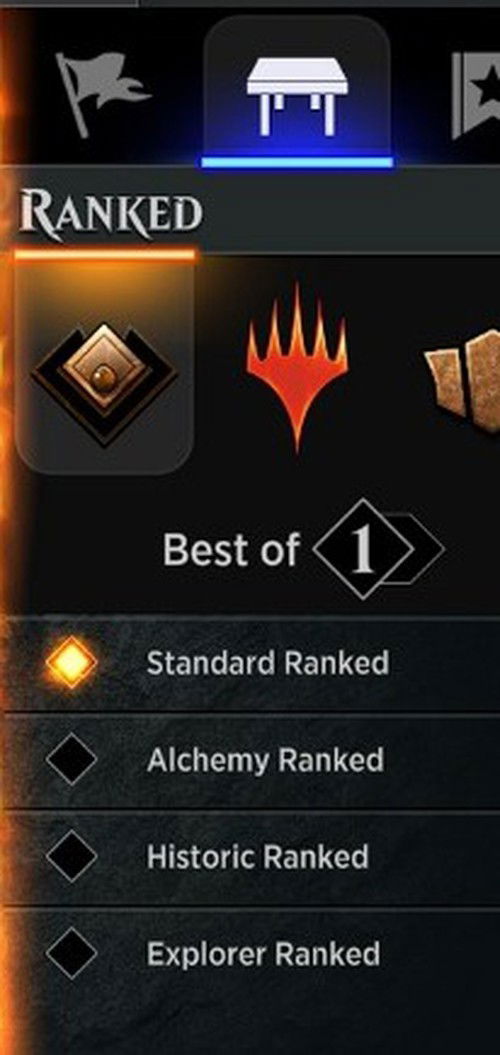
There are also Standard Brawl or Historic Brawl matches (Brawl is like a Commander with fewer cards). You must have a legal deck in the chosen format to play.
In the ranked queue there are several levels, where you can go up or down, and if you go up (goes from bronze to mythic), the higher the level, the greater the reward at the end of the season. Mythic players can also win tickets to larger, competitive events.
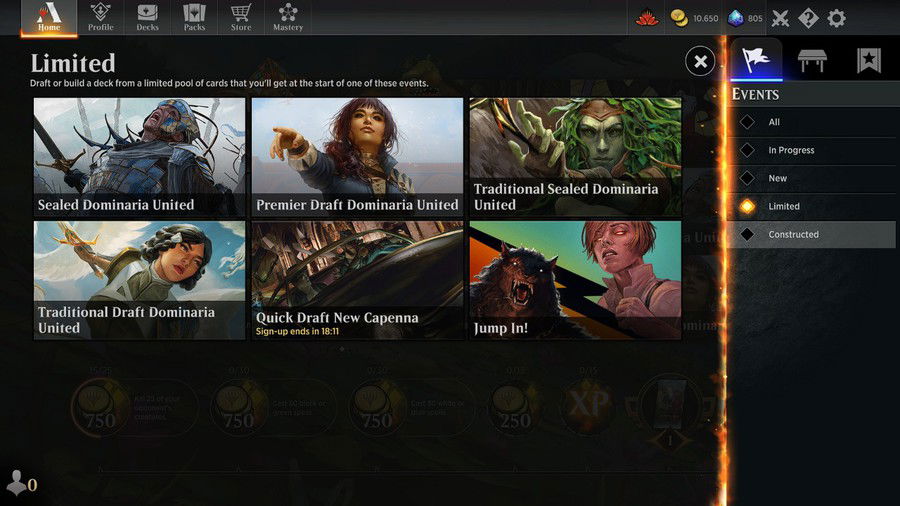
Ad
In the “events” tab, there is usually an entry (in gold or gems) and they are a bit more competitive, your opponents will be better prepared. Formats may vary as events are always updated, so always read the description for each one.
The prize pool and entry to tournaments also vary, so read carefully and plan what you're going to do before entering. If you manage to build your skills well and win these tournaments, you will get plenty of resources to increase your card collection in Magic Arena!
Community Tournaments
For both platforms, you can find free or paid tournaments, organized by the community or by content creators.
Here at Cards Realm, we have a tournament page with all the information.
Conclusion
I hope you were able to understand the differences, advantages and disadvantages of each platform!
If you have any questions or suggestions, just leave them in the comments below, and I'll be happy to answer them.
Until the next time!
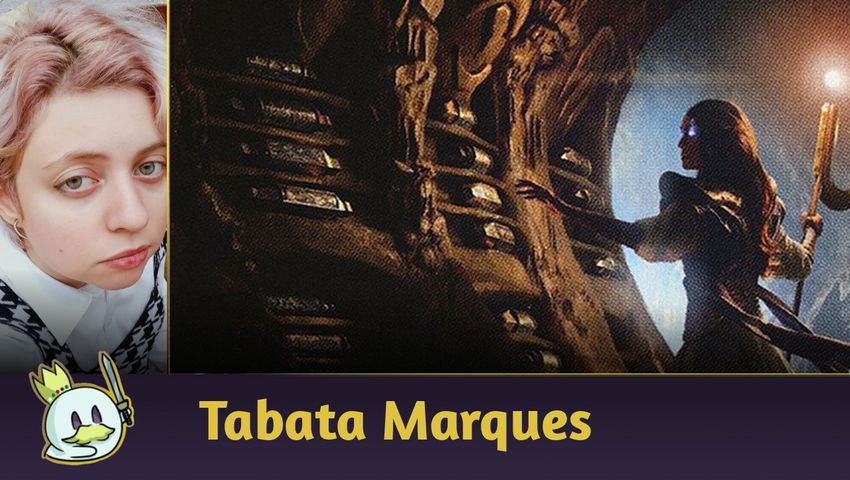


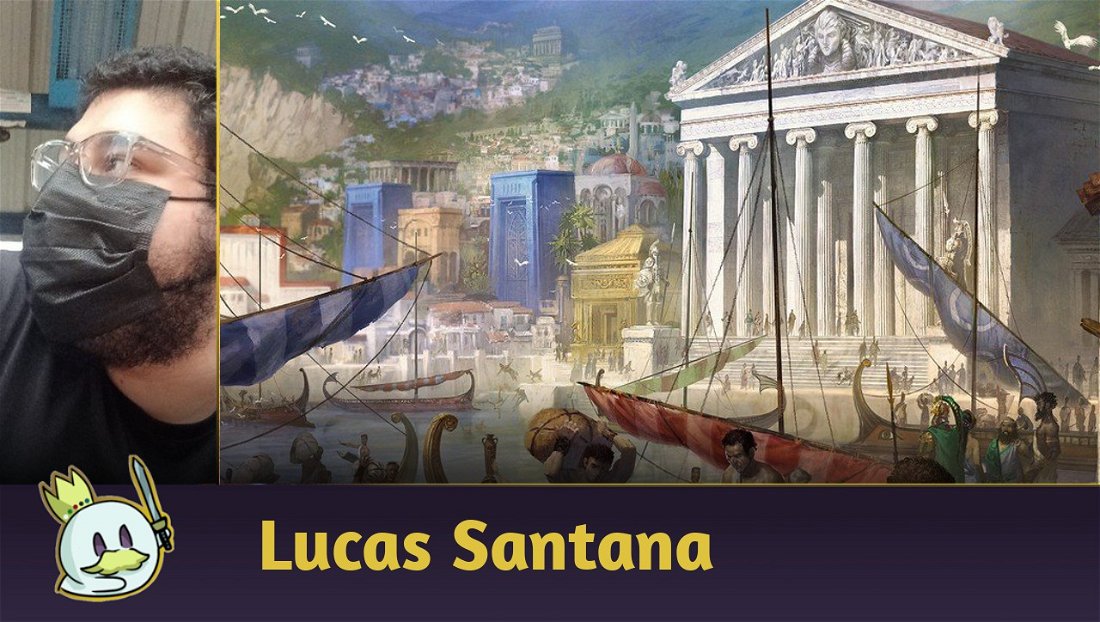
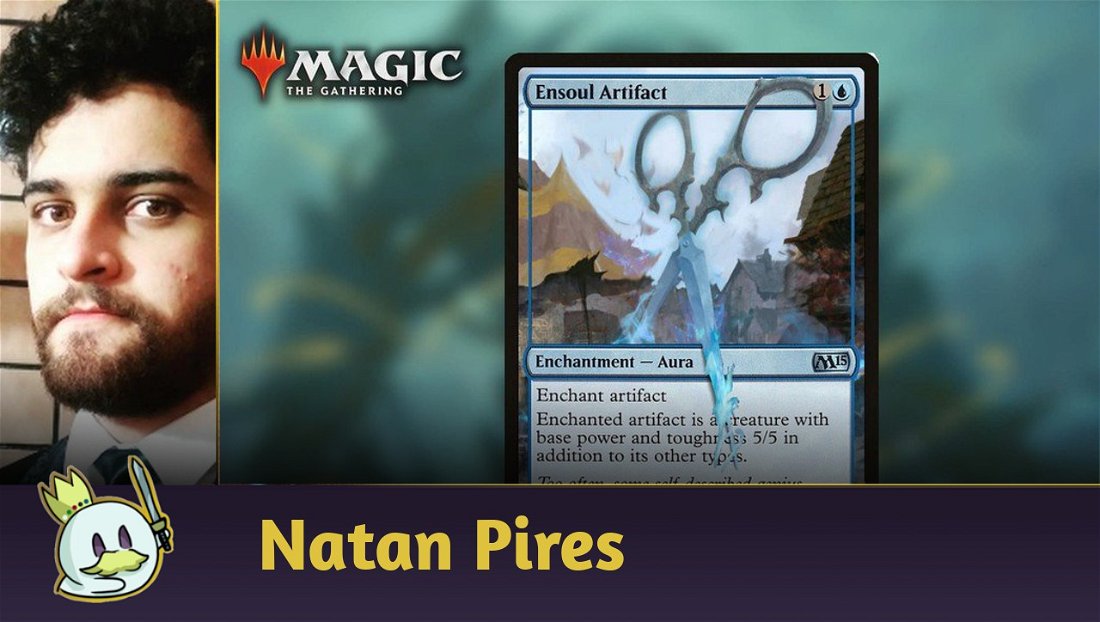

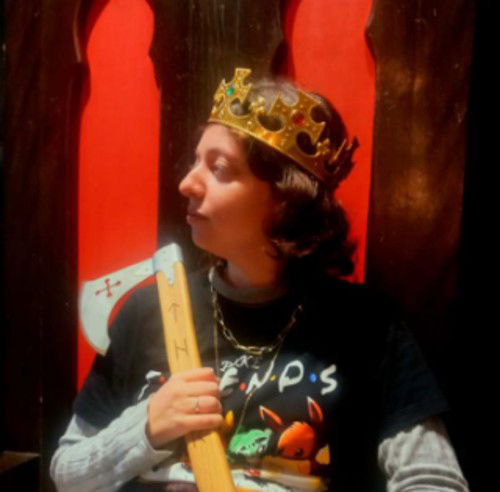

— Comentários0
Seja o primeiro a comentar